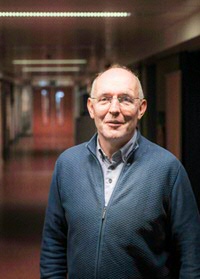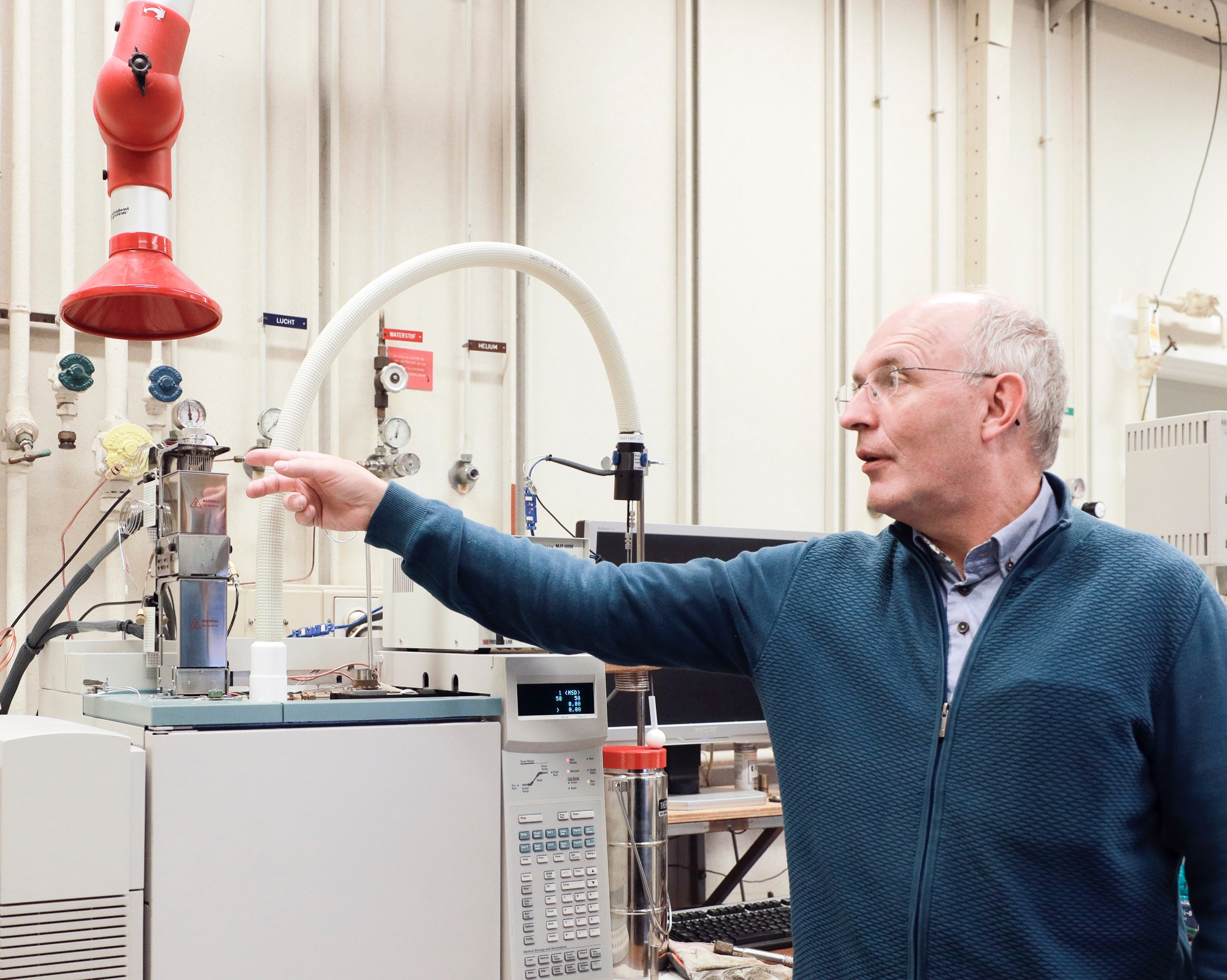From paper industry waste to sustainable kerosene

Erik Heeres is no ordinary scientist. Born in Pekela, the researcher evolved from teenager dabbling with a chemistry set to successful project leader of large Dutch and European research consortia. To this day, the Professor of Chemical Engineering is still passionately committed to building a sustainable and innovative future for the Northern Netherlands.
Text: Riepko Buikema, UG Communication Office; photos: Henk Veenstra
‘Here, take a look at these’, says Erik Heeres as he enthusiastically hands over his phone. He proudly shows several photos of a set of modern chairs made entirely from natural raw materials sourced from the ground in Groningen: hemp, magnesium, and potatoes. They will soon be available to buy at a local retailer. ‘A tangible product that appeals to people. We’re a step closer to the end result of all our hard work. That’s amazing.’
Birthplace
The chairs are a practical result of the East Groningen Innovation Hub (IHOG), of which the Pekela-born professor is one of the initiators. ‘Have you heard of that, the IHOG? Let me tell you tell you something about that.’ In collaboration with his brother André, lector in Bio-based Chemistry at Hanze University of Applied Sciences, professors Aard Groen and Willem Jonker, and entrepreneur Jakob Zwinderman, Heeres is committed to strengthening the economy of their birthplace. To kick things off, they asked themselves the question: what can we do with the raw materials and by-products found in our region?
Heeres: ‘We are exploring ways to combine hemp, salts, and starch – our basic ingredients. For example, we now add magnesium salts to hemp panels to make them fire-resistant, and then we glue everything together using potato starch. It’s a fantastic bio-based product that can be used to make construction more sustainable. We are working alongside Avebe, Hempflax, and Nedmag to give the region a boost.’

The ‘Groene Groninger’
Erik and his brother have already received the ‘De Groene Groninger’, a prize awarded to those who have made a significant contribution to the transition to sustainable energy and raw materials. But that doesn’t mean that the chemical engineering professor’s work is limited to the North. For example, he led the major European project ABC Salt, which developed a promising way of converting waste products from the paper and pulp industry into sustainable diesel and kerosene. ‘It was hugely successful’, says Heeres, as he gestures to a nifty little tube of kerosene on his desk as “proof” for his funding providers.
‘The source we used was lignin, an organic polymer. We filed three patents for our chemical trick with molten salts.’ This is precisely the kind of thing that motivates Heeres. ‘Playing around at the molecular level is incredibly fun, you can even win a Nobel Prize for it’, says Heeres, referring to his colleague Ben Feringa. ‘But it’s even better when something can be applied in a reasonably short period of time. There’s a very good chance that this discovery will be used in industry in ten years’ time.’
Quest
Also sitting on his desk is a bag of plastic chips – another source material in his quest for new chemical processes. ‘Interest in plastics has grown enormously in recent years. Recycling PET bottles is relatively easy, as is recycling carpets. But refrigerator insulation is a whole different story. That’s made up of polymers that are much harder to break down; the same applies to 80% of our packaging material. We are looking for ways to reuse these carbon sources as raw materials for the chemical industry or for the original product.’

Toolkit
In some ways, Heeres is still that ten-year-old boy from Pekela, experimenting at home with his chemistry set. ‘Our department’s core technology is pyrolysis. We decompose carbonaceous material by heating it to high temperatures, without allowing oxygen to reach it. If you heat the wood chips to 400 to 500 degrees you can break down the biopolymers and vaporize them. You can condense that vapour, and when you collect it, what you’re actually left with is liquid wood. Here, smell it. It smells like smoked sausage.’
A little further down the corridor, during a spirited tour of the lab’s chemical equipment, Heeres waxes lyrical about the endless possibilities. ‘There’s no limit to what you can do with the temperature and the source materials. You can do small-scale experiments. Our toolbox is full of catalysts, substances that speed up certain chemical reactions. The combinations are endless. With varying results, of course.’
In it together
Gone are the days when Heeres was the one turning the dials. ‘I always enjoyed working in the lab, but I’m too expensive for it now’, he says with a laugh. ‘My job now is more about getting our findings out into the world, making sure we can help industry use new processes, and coordinating research projects. That’s fun too.’
Especially if he gets to work with his brother, André. ‘We’re completely different people. I’m analytical, he’s more creative. We complement each other, which is really helpful when we work together.’ One of the projects that both Heeres brothers are involved in is the Smart & Circular Alliance, a network in which the UG, Hanze UAS, and the industry around Delfzijl, Emmen, Eemshaven, and Drachten are trying to combine the spectacular developments being made in smart industry and circular production.
‘Companies are going to have a lot on their plate; by 2030, they will have to be mostly green. Our ultimate goal is to make a real difference for the region. We want to help SMEs achieve their green goals by providing facilities, stimulating knowledge exchange, and providing training programmes. We’ve hired external consultants Elzo de Lange and Freek Lagerweij to help us develop these plans.’

Unconventional
Heeres is keen to point out that he’s not a conventional researcher. ‘I love it when a PhD student makes a great discovery or when we achieve our goal as part of an EU project, when an international team like that produces tangible results. But I also enjoy my meetings with Elzo and our industrial partners, where everyone is so enthusiastic about working together.’
The words have barely left his lips when Heeres receives a call from an entrepreneur in his network asking him to participate in an application for funding from the Just Transition Fund – a fund into which the EU is pumping €230 million to make the economy in the Northern Netherlands more sustainable and greener.
Courageously moving forward
And is Heeres optimistic about this sustainable future? ‘We don’t have a choice. Our region has a lot of opportunities, but you have to take advantage of them. We have great industries, a strong agricultural sector. This region used to be one of the richest in the country: we had the potato starch industry, shipbuilding, peat extraction. That’s the way forward; you have to look at what you can do!’
| Last modified: | 01 February 2023 2.11 p.m. |
More news
-
24 March 2025
UG 28th in World's Most International Universities 2025 rankings
The University of Groningen has been ranked 28th in the World's Most International Universities 2025 by Times Higher Education. With this, the UG leaves behind institutions such as MIT and Harvard. The 28th place marks an increase of five places: in...
-
05 March 2025
Women in Science
The UG celebrates International Women’s Day with a special photo series: Women in Science.
-
16 December 2024
Jouke de Vries: ‘The University will have to be flexible’
2024 was a festive year for the University of Groningen. In this podcast, Jouke de Vries, the chair of the Executive Board, looks back.
